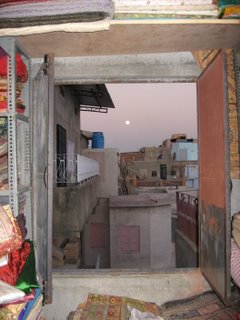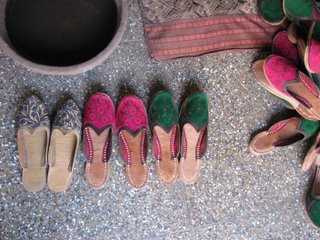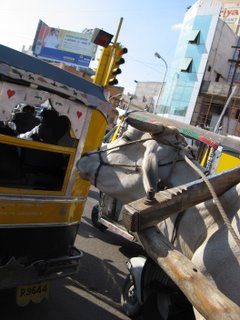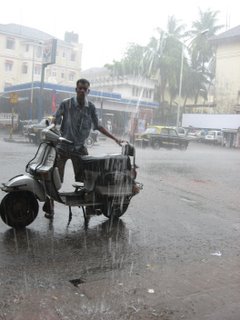Wednesday, October 25, 2006
Tuesday, October 24, 2006
Saturday, October 21, 2006
They Reminisce Over You
Shree India, they do reminisce, they do. By "they" I mean I reminisce, to whomever will listen for five minutes or really just make eye contact over the water cooler at work. The food is a common subject of rhapsody, the-- Oh god the chapatti and the red chile cabbage!!, I stammer, and they nod, yes, chapatti...?
Yes, New York is cool as cool can be, I mean stylish as all hell--you do forget about the skinny jeans posses--and even the dinky places (pink and orange plastic coated Dunkin' Donuts, sprouting up on either end of my block) make a decent latte. It's nice to be able to sleep without sweating all over malarial mosquitos. It's nice to walk, fast, without sucking in dust or getting run over by motorbikes (cross fingers) or rickshaws, or cows. But I find myself hunching over in the cold, walking-cum-sprinting through crowded sidewalks, honing tunnel vision against the homeless pissing on the side, becoming the coffee slurping, impatient New Yorker again.
Whatever, more photos...
Yes, New York is cool as cool can be, I mean stylish as all hell--you do forget about the skinny jeans posses--and even the dinky places (pink and orange plastic coated Dunkin' Donuts, sprouting up on either end of my block) make a decent latte. It's nice to be able to sleep without sweating all over malarial mosquitos. It's nice to walk, fast, without sucking in dust or getting run over by motorbikes (cross fingers) or rickshaws, or cows. But I find myself hunching over in the cold, walking-cum-sprinting through crowded sidewalks, honing tunnel vision against the homeless pissing on the side, becoming the coffee slurping, impatient New Yorker again.
Whatever, more photos...
Saturday, October 14, 2006

My feeding by Manu, a Veerni nurse, on Friday--followed by feedings by Santosh, Vimlesh and Jaspal. I need to go for an ashram-slimming but instead I'm holed up at the ITC Hotel & Towers outside Mumbai international airport. My flight to New York via Heathrow, London, takes off at 2:15am so I'm spending my time wandering around the super-santicized environs here--this hideously tacky hotel is under the Sheraton management. It's doing my head in. Purely to kill time--one workout is not going to make a dent in my chipatti flab--I did a stint on the fitness center's Eliptical trainer, reading Indian "Cosmopolitan" (a series of Bollywood fashion spreads but mostly imported copy from Cosmo UK, including features on the dangers of drinking games and friends-with-benefits hookups). The plastic machines and flat screen TVs made me wanted to cry so I ducked into a yoga class which made me cough a lot. Jodhpur crud coming out? To prevent my lungs from adjusting to filtered air--too soon, too soon!--I ran outside gasping for some life. Luckily, it was on offer outside the Sheraton's 15-foot white and gold gates. Just on the other side was a sewage canal running into a slum fronted by merry little shops proffering fried bread, barbering, moterbike tuneups, live chickens, dead chickens, and phone calls. Inside the latter shop, shouting onto the phone to block out the firecrackers, horns and street banter. I was saying, I don't want to leave.
Wednesday, October 11, 2006
Having a Bumpin' Time [Insert pun here]
--So freaking bumpy! My arms, legs, toes, neck even face--under one eye!--is swollen with mosquito spit deposits. There are also some small rashy bumps on right thumb and forearm. No dengue yet on the staff, cross fingers, though two are down with malaria. Mahendra is one -- the English-fluent, computer-savvy 25 year old who saves my life daily...
On the "bump" subject -- I am reaching with this blog title-- I am done with village roads, thank god, for at least a year. For my last field visit, I rattled out to Barwala and Aktali to see some old students of mine. Both girls want to keep studying but their grandfather won't let them attend the hostel Veerni runs in Jodhpur, so they keep, er, busy selling Parle-C biscuits at their dad's corner shop (it's not that they don't have the money--his grossly distended belly is downright bizarre in rural Rajasthan, where most people are thin-to-emaciated). Having taken sweet gingery chai and biscuits with Goury and Kalpna (who tried to take me hostage) I almost vomited in the car ride home on the one-lane gravelly road with the typically hair-raising games of chicken with gigantic Tata trucks.
Going to sleep -- last night the dog fights outside and sticky heat/mosquitos kept me up... Due to power cuts the fan(s) were off.
On the "bump" subject -- I am reaching with this blog title-- I am done with village roads, thank god, for at least a year. For my last field visit, I rattled out to Barwala and Aktali to see some old students of mine. Both girls want to keep studying but their grandfather won't let them attend the hostel Veerni runs in Jodhpur, so they keep, er, busy selling Parle-C biscuits at their dad's corner shop (it's not that they don't have the money--his grossly distended belly is downright bizarre in rural Rajasthan, where most people are thin-to-emaciated). Having taken sweet gingery chai and biscuits with Goury and Kalpna (who tried to take me hostage) I almost vomited in the car ride home on the one-lane gravelly road with the typically hair-raising games of chicken with gigantic Tata trucks.
Going to sleep -- last night the dog fights outside and sticky heat/mosquitos kept me up... Due to power cuts the fan(s) were off.
Tuesday, October 10, 2006
News of the World
I got my international news from a single line of Hindi scrawled on a village chalkboard: as somebody translated, North Korea of Testing Atomic Doing. A Veerni-schooled girl in Kakelaw, now teaching a fourth grade class of her own, presented this news flash to her kids, and it was the first I'd heard. I'm in a dusty news vacuum here in Jodhpur. The news we do hear? Next to a photo of Bradgelina riding in a Puna rickshaw, the Times of India announced that dengue cases reached 1000 in Delhi (3000 nation wide yesterday, could be 6000 now). It's killed five so far in Jodhpur so Sun City's Neeta is advising me to stay out of the old walled city because there's lots of standing water (not to mention sewage running down the sides of the narrow streets). Chikinguyna is on the rise. Boils are spotting up on village kids' ankles. Monsoon giveth, monsoon taketh away.
I feel fine, actually, especially after a rare glass of Italian red at the spotlit Art Deco extravaganza known as Umaid Bhavan Palace, on Chittar Hill just up from migrants' tents and their smoldering trash heaps. There was just a fat orange moon rise over this scene.
Just hoping with dengue's incubation period of 4-7 days I'll be back in New York when the hemorrhaging begins. Ha! A joke. There are 1.4 million people in this city so chances are the red-color lady mosquitoes will pass me over...
I feel fine, actually, especially after a rare glass of Italian red at the spotlit Art Deco extravaganza known as Umaid Bhavan Palace, on Chittar Hill just up from migrants' tents and their smoldering trash heaps. There was just a fat orange moon rise over this scene.
Just hoping with dengue's incubation period of 4-7 days I'll be back in New York when the hemorrhaging begins. Ha! A joke. There are 1.4 million people in this city so chances are the red-color lady mosquitoes will pass me over...
Monday, October 09, 2006
Field Research
... And back at Sun City, 8pm, Monday evening, getting measured for salwar suits (tunic and pants combo) in signature Jodhpur "banda" print, or "tie and dye" as Indians translate it. I wore out my last tie-and-dye tunic getting grubby on the train circuit last year--but won't have an opportunity this time around for 29 hour train rides in three-bunk non-ac class. I can't believe I only have five days left.
Today I tracked down an old student from a village called Khatawas. She passed her class 10 exams, a great feat for village girls, but still got shipped off to her in laws (she was married at 10). She's knocked up now, 3 months, at 15. We found her by off-roading in our white Jeep across dry fields, then walking for three miles in the hot midday sun across some prickles-choked bean fields. Her little brother navigated. A sweet skinny as a reed kid in a neat yellow government school top, he'd tried to visit, with another sister, a few weeks back and was turned away by Nirmla's rabid mother in law. Practically foaming at the mouth, this woman is every newlywed Indian girl's worst nightmare: critical, rough talking, and physically abusive. She beats Nirmla because her dowry was inadequate. Even at 5', in a bright yellow langa suit (long skirt and top), she was scary as hell, and I didn't understand a word she said. Veerni's would-be translator called in with a motorbike "accident" (someone joked that I scared her away) so the situation is still a bit fuzzy, but basically this girl is miserable. To make matters worse, her husband is a homely, five-foot-two (max) 23 year old, with a distracting, inappropriate grin over his large moustache. He was working as a carpenter in Mumbai--all I could think was AIDS, a common plight of migrant workers--but now is back in his village. Not sure why but will get the story when the interview is translated.
Today I tracked down an old student from a village called Khatawas. She passed her class 10 exams, a great feat for village girls, but still got shipped off to her in laws (she was married at 10). She's knocked up now, 3 months, at 15. We found her by off-roading in our white Jeep across dry fields, then walking for three miles in the hot midday sun across some prickles-choked bean fields. Her little brother navigated. A sweet skinny as a reed kid in a neat yellow government school top, he'd tried to visit, with another sister, a few weeks back and was turned away by Nirmla's rabid mother in law. Practically foaming at the mouth, this woman is every newlywed Indian girl's worst nightmare: critical, rough talking, and physically abusive. She beats Nirmla because her dowry was inadequate. Even at 5', in a bright yellow langa suit (long skirt and top), she was scary as hell, and I didn't understand a word she said. Veerni's would-be translator called in with a motorbike "accident" (someone joked that I scared her away) so the situation is still a bit fuzzy, but basically this girl is miserable. To make matters worse, her husband is a homely, five-foot-two (max) 23 year old, with a distracting, inappropriate grin over his large moustache. He was working as a carpenter in Mumbai--all I could think was AIDS, a common plight of migrant workers--but now is back in his village. Not sure why but will get the story when the interview is translated.
Monday morning, 9am: I am slurring good morning to Neeta and Push, clumsily bumping my knee on coffee tables, putting tea in the pitcher of milk instead of the other way around. I slept until 8:10, you see, which means I am on JOdhpur time. Yes!
Friday, October 06, 2006
Maybe Yes, Maybe No
Are they mistranslations or is truth-fudging an art perfected, like red-hot lime pickle, in India?
Naturally, shops in poor countries lie to white people shopping there. In fact, I was forewarned that Maharani, the 100 year-old four-floor emporium of textiles embedded in Jodhpur's old city market, is prone to exaggeration. "Our factory is 90 kilometers away from Jodhpur, and we have the women working in their homes, hand-sewing and all," said the rep at Maharani Art Emporium. "But I heard you don't have a factory," I countered, "that you buy from wholesalers." The rep flat-out denied this and threw in a few more details about the whereabouts of the factor(ies), then told us about their "exclusive" contract with Hermes selling the same peacock-emblazoned cashmere shawls that Joan, my shopping buddy, had seen at another market in town earlier (the rep there also mentioned Hermes).
Then there is the fun of conducting interviews in villages where birthdays are described as being "the Diwali festival before the good monsoon". But I thought I could trust the Veerni Project's doctor at least to prod a bit harder for the real story. "This girl is engaged, she has completed 16 years and won't go to live with her husband until she reaches 18" she told me in Sewala yesterday, nodding approvingly (the girl's classmates had just happily shouted in unison that "18 is the age for marriage" and that they further more wouldn't observe purdah, wear veils, after they wed). How empowered were these girls!, I thought, nodding, thinking to tell the project's founder how much success we'd found already in this "very backward" village we'd taken on a few years back. Ten minutes later, the girl relates the details of her marriage at the age of six, and the doctor nods, showing no sign of surprise as the story completely reversed itself...
"My brother is in hospital, he is having malaria, bleeding from the nose and all," said my guest house host Neeta. But it turns out that her brother actually has dengue, the fever that is sweeping India like the latest Priyanka Chopra song. The diagnosis is much more alarming given that as recently as Wednesday there were "60 cases" on a campus in Delhi and now there are upwards of 700. Following our doctor's briefing yesterday, Veerni's social and medical team lectured at villages and at the girls' hostel on the peril that red mosquitos pose in full daylight: Internal bleeding, following fever, body ache and vomiting. "Cover water," they advised, "look out for the red ones". Neeta's brother, who lives in nearby Jaipur, was bleeding out everything they were transfusing him through the nostrils, but seems to be ok today.
These are random incidents of miscommunication, or white lies, in the first case. But they lead me to wonder: should I toss my notes in the trash heap on the roadside?
Naturally, shops in poor countries lie to white people shopping there. In fact, I was forewarned that Maharani, the 100 year-old four-floor emporium of textiles embedded in Jodhpur's old city market, is prone to exaggeration. "Our factory is 90 kilometers away from Jodhpur, and we have the women working in their homes, hand-sewing and all," said the rep at Maharani Art Emporium. "But I heard you don't have a factory," I countered, "that you buy from wholesalers." The rep flat-out denied this and threw in a few more details about the whereabouts of the factor(ies), then told us about their "exclusive" contract with Hermes selling the same peacock-emblazoned cashmere shawls that Joan, my shopping buddy, had seen at another market in town earlier (the rep there also mentioned Hermes).
Then there is the fun of conducting interviews in villages where birthdays are described as being "the Diwali festival before the good monsoon". But I thought I could trust the Veerni Project's doctor at least to prod a bit harder for the real story. "This girl is engaged, she has completed 16 years and won't go to live with her husband until she reaches 18" she told me in Sewala yesterday, nodding approvingly (the girl's classmates had just happily shouted in unison that "18 is the age for marriage" and that they further more wouldn't observe purdah, wear veils, after they wed). How empowered were these girls!, I thought, nodding, thinking to tell the project's founder how much success we'd found already in this "very backward" village we'd taken on a few years back. Ten minutes later, the girl relates the details of her marriage at the age of six, and the doctor nods, showing no sign of surprise as the story completely reversed itself...
"My brother is in hospital, he is having malaria, bleeding from the nose and all," said my guest house host Neeta. But it turns out that her brother actually has dengue, the fever that is sweeping India like the latest Priyanka Chopra song. The diagnosis is much more alarming given that as recently as Wednesday there were "60 cases" on a campus in Delhi and now there are upwards of 700. Following our doctor's briefing yesterday, Veerni's social and medical team lectured at villages and at the girls' hostel on the peril that red mosquitos pose in full daylight: Internal bleeding, following fever, body ache and vomiting. "Cover water," they advised, "look out for the red ones". Neeta's brother, who lives in nearby Jaipur, was bleeding out everything they were transfusing him through the nostrils, but seems to be ok today.
These are random incidents of miscommunication, or white lies, in the first case. But they lead me to wonder: should I toss my notes in the trash heap on the roadside?
Wednesday, October 04, 2006
Up All Night, sort of
Sun City, day 2. No, is it 3? I am losing track. Still jet lagged, 8pm seems like 6am sunrise after pulling an all nighter. Last night at dinner with darling Govind Rathore, owner of a nearby guest house and man-about-town, I was slumping under the table like a 5 year old. I put my head down at one point. So today, it's 6:30pm and my head is swimming. Actually it'd be nice if I had the old 6am post-party clarity but -- not a chance after a day in Jodhpur's boring-hot sun.
After a frustrating morning of half-meetings--half-understood, since the social worker I was trying to interview only pretends to speak English, and half-finished, since we were interrupted--I headed out to the fields, which are surprisingly green after a decent monsoon. After dodging herds of goats, and their red-turbaned shepherds (will post photo shortly), we arrived in Binewas, a village of about 4000. The pink saree-clad promoter, or project rep, jumped into the car and we trucked out over a bumpy path-road to an enclave of Malis, a farming tribe. Technically it was a one-family home but this family numbers 60. There are 21 grandkids living here, and in fact, the scattering of stone buildings surrounded by cows and bed frames was overrun with children. Three were naked and had lazy eyes. As we sat and chatted (well, I just sat) with their parents, the children, one by one, found articles of clothing. One would hoist a long shirt over his shoulder, like he didn't know what to do with it, until his mother put it on him after an hour or so (at the end of our two hour stint there the kids had an outfit on between four of them). A gangly gang of pre-teens turned up later in dusty blue government school uniforms. The nurse, Vimlesh, a bright, quick-moving 29 year old with an 8 year old at home, examined pregnant woman--in this family there are currently five, all about to pop--while a cow gave birth outside. Then the social worker gave a lecture on family planning: "Small family, happy family!" is the typical theme. The woman sat on the floor under their pink and orange scarves in front of the patriarch, a yellow-tooth man perched on a bed frame under a large tree. For a while the social worker bantered on uninterrupted and then the old guy started chiming in, gesturing, yelling at times, then randomly laughing. I understood about three words intersperced in the seemingly-heated debate, like "char" (four) "bacha" (baby) and "acha" (good). The nurses began chiming in, yelling back, while the women bobbeled their heads on the ground (this could mean "absolutely yes" or "absolutely no" depending on the bobble-style, so I have no idea). Just as I was about to conclude, in my notes, that this family will continue to abstain from birth control, the social worker looked at me and concluded, "he is very much in favor of small families".
After a stop in one more village we drove back and had more meetings, with lots of finger pointing and yet more chai (was that the fifth cup?). Now I want to read my a novel and zone out but we have a dinner meeting.
After a frustrating morning of half-meetings--half-understood, since the social worker I was trying to interview only pretends to speak English, and half-finished, since we were interrupted--I headed out to the fields, which are surprisingly green after a decent monsoon. After dodging herds of goats, and their red-turbaned shepherds (will post photo shortly), we arrived in Binewas, a village of about 4000. The pink saree-clad promoter, or project rep, jumped into the car and we trucked out over a bumpy path-road to an enclave of Malis, a farming tribe. Technically it was a one-family home but this family numbers 60. There are 21 grandkids living here, and in fact, the scattering of stone buildings surrounded by cows and bed frames was overrun with children. Three were naked and had lazy eyes. As we sat and chatted (well, I just sat) with their parents, the children, one by one, found articles of clothing. One would hoist a long shirt over his shoulder, like he didn't know what to do with it, until his mother put it on him after an hour or so (at the end of our two hour stint there the kids had an outfit on between four of them). A gangly gang of pre-teens turned up later in dusty blue government school uniforms. The nurse, Vimlesh, a bright, quick-moving 29 year old with an 8 year old at home, examined pregnant woman--in this family there are currently five, all about to pop--while a cow gave birth outside. Then the social worker gave a lecture on family planning: "Small family, happy family!" is the typical theme. The woman sat on the floor under their pink and orange scarves in front of the patriarch, a yellow-tooth man perched on a bed frame under a large tree. For a while the social worker bantered on uninterrupted and then the old guy started chiming in, gesturing, yelling at times, then randomly laughing. I understood about three words intersperced in the seemingly-heated debate, like "char" (four) "bacha" (baby) and "acha" (good). The nurses began chiming in, yelling back, while the women bobbeled their heads on the ground (this could mean "absolutely yes" or "absolutely no" depending on the bobble-style, so I have no idea). Just as I was about to conclude, in my notes, that this family will continue to abstain from birth control, the social worker looked at me and concluded, "he is very much in favor of small families".
After a stop in one more village we drove back and had more meetings, with lots of finger pointing and yet more chai (was that the fifth cup?). Now I want to read my a novel and zone out but we have a dinner meeting.
Monday, October 02, 2006
Durga

The site of the Mumbai Durga puja I attended. A bit blurry, but can you spot the demon under Durga's tiger? His name is Mahishasura and he was created when his dad, a king, fell in love with a water buffalo. Not to be underestimated, he drove all the gods out of heaven until the chief three, Brahma, Shivaji and Vishnu, created Durga, aka Shakti, aka Parvati. She's got a lot of arms. Below is another image of her at a Delhi temple: http://en.wikipedia.org/wiki/Image:S344_durga-idol-golden.png





















